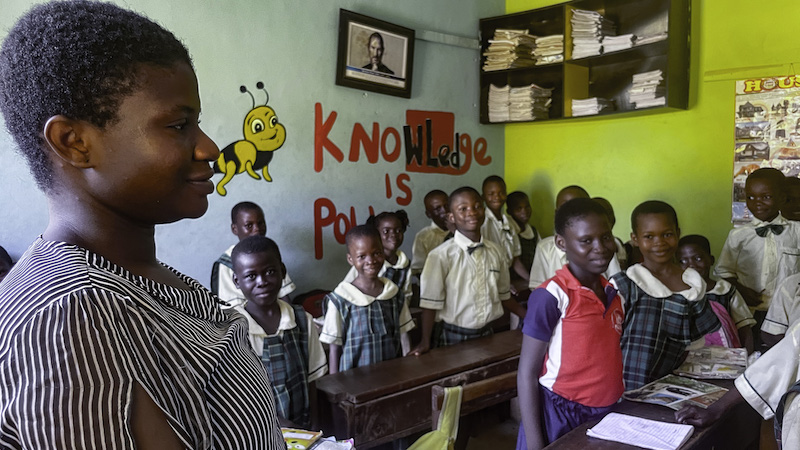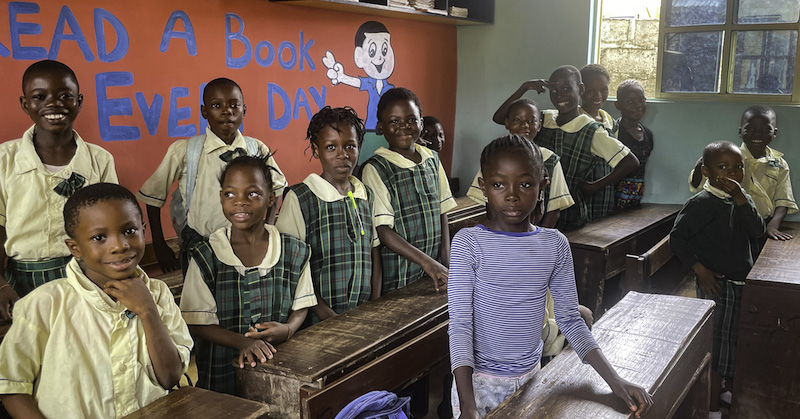In Nigeria, the adult literacy* rate is near 60% and nearly 40% of educators have not received certification to teach. Improving access to continuing education is an urgent need for educators and there’s a local team using the ECHO Model to help. However, they face one huge hurdle: the ability to connect to the internet.
“In addition to total system outages, the most significant problem for connectivity to ECHO sessions is being able to afford it. The value of Nigerian currency has depreciated, and this is a real impact on ECHO session attendance,” says Olajumoke Beulah Adigun, Ph.D., faculty team lead. The Nigeria ECHO Education Hub team includes three education graduate students based in Oklahoma and two team members in Nigeria.
Clement Audu, one of the graduate students, devised a solution: break the recorded ECHO session into bite-size, lower-data videos posted to Facebook and WhatsApp groups. “People are really gravitating toward the video clips because it means they can participate, even when they cannot afford data at the time of the session, or lose their connection,” says Audu.
Adapting the ECHO Model for a New Context
Launched in 2022, the Nigeria education team had two critical pieces of support: an established ECHO network running more than 30 health programs in the country, as well as support from abroad: the Oklahoma State University education ECHO team, comprising several Nigerian graduate students and educators, helped with the initial launch and offered ongoing mentorship.
“What we want to achieve, over the years, is to empower participants with understanding ECHO more and more, so that eventually, the program and leadership stand on their own in Nigeria,” says Dominic Egure, Ph.D., another Hub team member.
After the pilot ECHO program, the Hub team used survey feedback to choose priorities for the next participant group. They focused on leveraging technology that works best for limited data access, such as Google Suite and Plotagon (for lesson plans and educational videos); increasing the frequency of ECHO sessions; and providing credentials that could be used for professional advancement.

A teacher and ECHO participant at Tosin Cormenius Primary School in Nigeria leverages tools from ECHO to create more engaging curriculum for her students. Photo Credit: ECHO Education Nigeria Hub Team
Measuring Success
With more than one hundred participants in each ECHO session, the ECHO team questioned whether participants were using their new knowledge in their work, and they received a resounding “yes” (80%). One participant received a state-level award for building on initiatives they learned in ECHO. The Hub team attributes their success to working closely with the Nigerian community to evaluate and adapt to local needs.
The Hub team members have also examined ECHO’s impact in their graduate school research. The American Educational Research Association and the University Council for Educational Administration tapped Egure to present on his research, titled “Exploring Value Creation in ECHO Education Nigeria Social Learning Space: A Qualitative Case Study.”
To learn more about Project ECHO in Africa, email Dr. Caroline Kisia, director.
Featured Image Caption: Students at Tosin Cormenius Primary School, one of the schools partnering with ECHO Education Nigeria. Photo Credit: ECHO Education Nigeria Hub Team, October 2024.
*Adult literacy is the percentage of people, aged 15 and older, who can read, write, and understand simple statements about their daily lives.
###
Acknowledgement: The ECHO Education Nigeria team would like to recognize Ed Harris, Ph.D., a retired professor of educational leadership, who led the pioneering of this work in 2021 and continues to serve in support of the work. Beulah Adigun, Ph.D., assistant professor at Oklahoma State University, who joined this work in 2022, has since served as the Faculty Team Lead for ECHO Education Nigeria. Other Hub team members include Dominic Egure, Ph.D., Clement Audu, and Micheal Afolabi, all of whom were part of the pioneering efforts with Dr. Harris. Sede Caroline and Olowoyeye-Taiwo Tosin are also members of the Hub Team based in Nigeria. They work tirelessly to coordinate ECHO Education Nigeria’s work locally.
ECHO Education Nigeria has a dedicated team of technical support specialists who provide day-to-day technical support to participants through the group’s WhatsApp page. These specialists include Oluwayemi Osite, Bolanle Oladipo, Ph.D., and Simdowa Audu. ECHO Education Nigeria has also received support from several faculty members at Oklahoma State University, including Katherine Curry, Ph.D., Jentre Olsen, Ph.D., Ashley Fiegener, Ph.D., Mary Jo Self, Ph.D., Tutaleni Asino, Ph.D., and Penny Thompson, Ph.D.


